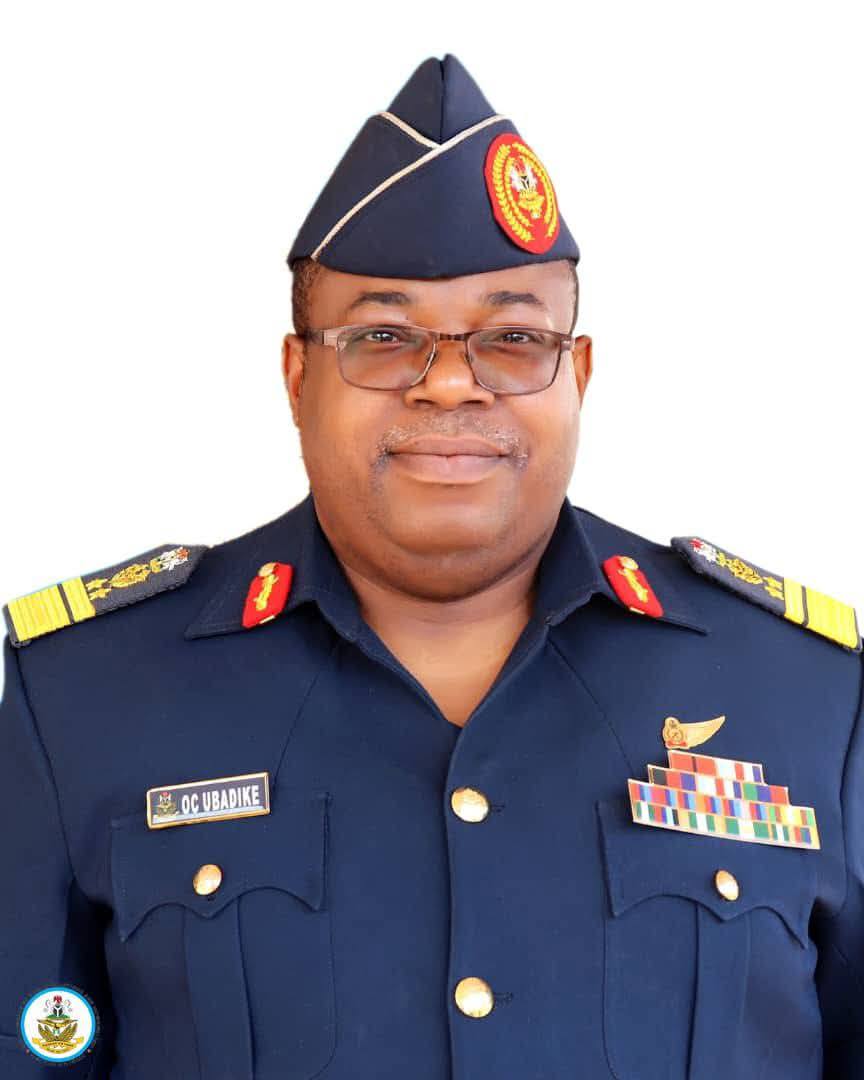Anambra Man, Chiedu Ubadike, Becomes Nigerian Airforce’s First-Serving Professor
In a milestone that has set a new standard for excellence within the Nigerian military establishment, Air Vice Marshal (AVM) Osichinaka Chiedu Ubadike, an illustrious son of Anambra State, has been conferred the title of Professor of Aerospace Engineering by the Governing Council of the Air Force Institute of Technology (AFIT), Kaduna. This historic elevation marks the first time in the history of the Nigerian Air Force (NAF) that a serving officer has been awarded a professorship while still actively engaged in military service.
Beyond the personal achievement of AVM Ubadike, this development signals a major leap forward in the Nigerian military’s embrace of research and development (R&D) as critical pillars for national security, technological advancement, and strategic autonomy.
Air Vice Marshal Ubadike’s ascent to this remarkable academic height is not a matter of happenstance but the result of years of rigorous scholarship, unwavering dedication, and visionary leadership.
YOU MAY READ
President Tinubu Appoints Anambra APC Chairman Chief Basil Ejidike as Chairman Governing Board, National Root Crops Research Institute, Umudike
Born in Anambra State, southeastern Nigeria, Ubadike displayed an early aptitude for science and innovation. His academic journey began at the prestigious Nigerian Defence Academy (NDA), where he earned a First-Class Honours degree in Electrical Electronics Engineering. His brilliance at NDA was evident, earning him accolades and setting him apart from his peers.
Driven by a relentless quest for knowledge and excellence, Ubadike pursued further studies abroad. He earned both a Master’s degree and a Doctorate (PhD) in Aerospace Engineering and Aerospace Vehicle Design from Cranfield University in the United Kingdom, one of the world’s leading institutions for aerospace research and education.
Not content with these laurels, Ubadike further enhanced his academic profile with three additional Master’s degrees from Nigerian institutions, including Ahmadu Bello University and the Nigerian Defence Academy, focusing on specialized areas critical to the advancement of aerospace technology and military operations.
Air Vice Marshal Ubadike’s academic prowess has translated into tangible contributions to the Nigerian Air Force’s modernization drive.
Among his most notable achievements is his pivotal role in the research, design, and development of the Nigerian Air Force’s indigenous Unmanned Aerial Vehicle (UAV) program. Under his leadership, NAF achieved a significant breakthrough with the successful production of UAVs that meet specific operational needs, reducing dependence on foreign technology and saving critical resources.
The indigenous UAV project is a landmark in Nigeria’s quest for strategic independence in defense technology. It reflects a broader global trend where nations recognize the importance of developing homegrown capabilities in aerospace and defense industries, often seen as vital to national sovereignty.
Air Vice Marshal Ubadike’s leadership in these projects underscores the growing recognition within the military of the indispensable role of research, innovation, and academia in national defense strategy.
YOU MAY READ
Mark Okoye appointed managing director of South East Development Commission
In military institutions worldwide, especially in technologically advanced countries like the United States, China, and Russia, the intersection of academic excellence and operational expertise is not new. However, within the Nigerian context, it represents a transformative shift.
By appointing a serving officer as a Professor, the Nigerian Air Force signals its commitment to embedding research and academic rigor within its operational doctrines. It is an acknowledgment that wars of the future will not be won by manpower alone but by superior technology, innovation, and intellectual agility.
Furthermore, Ubadike’s professorship at AFIT is expected to galvanize a new generation of Air Force personnel towards academic pursuits, encouraging officers to blend their operational experiences with scientific inquiry to develop indigenous solutions to Nigeria’s unique security challenges.
That AVM Ubadike hails from Anambra State is particularly noteworthy. Anambra has long been recognized as a cradle of intellect, innovation, and enterprise in Nigeria. From producing Nigeria’s first President, Dr. Nnamdi Azikiwe, to industrial titans and thought leaders across various sectors, the state’s contribution to Nigeria’s development narrative is unparalleled.
Ubadike’s emergence as a serving professor is thus a continuation of this proud tradition. His achievement offers yet another testament to the spirit of resilience, brilliance, and ambition that characterizes the people of Anambra.
It also serves as an inspiration for young Anambrarians and Nigerians at large, emphasizing that excellence in service to the nation transcends all boundaries — ethnic, professional, and academic.
YOU MAY READ
President Tinubu swears in Bianca Ojukwu
The Nigerian Air Force, like all branches of Nigeria’s Armed Forces, stands at a crossroads. Modern security challenges — from asymmetric warfare to cyber threats and unmanned aerial operations — demand a force that is not only battle-hardened but intellectually sophisticated.
The elevation of AVM Ubadike to Professorship could very well be a harbinger of a new era where the Air Force places greater emphasis on internal capacity building, R&D, and collaboration with academic institutions.
It may spur reforms leading to the establishment of research-focused military units, greater investment in defense laboratories, and the nurturing of a new cadre of scholar-soldiers who will pioneer innovations tailored to Nigeria’s defense and security needs.
AFIT, under the guidance of professionals like Ubadike, is poised to become a center of excellence not just for Nigeria but for the West African region, attracting partnerships, funding, and attention from the global aerospace community.
Chief of the Air Staff, Air Marshal Hasan Abubakar, hailed the development as “a watershed moment in the history of the Nigerian Air Force,” emphasizing that it aligns perfectly with NAF’s vision of becoming a highly professional and disciplined force through robust intellectual capital.
Several colleagues and students at AFIT described Ubadike as a “mentor of mentors,” noting his unique ability to bridge the gap between complex theoretical concepts and their practical applications in defense settings.
One student remarked, “He doesn’t just teach aerospace engineering; he lives it. His classes are a blend of technical mastery, operational experience, and an infectious passion for innovation.”
Such testimonies affirm that Ubadike’s impact transcends personal achievement; it is about building a legacy of excellence within the institution and the wider defense sector.
Despite his towering academic and professional achievements, AVM Ubadike remains a figure of remarkable humility.
Those who know him closely speak of a man deeply committed to service, more interested in results than recognition. He is known for his hands-on approach, often personally supervising student projects, offering mentorship beyond the classroom, and tirelessly advocating for improvements in research funding and infrastructure at AFIT.
In speeches and writings, he consistently emphasizes the critical importance of indigenous innovation, often quoting African proverbs about self-reliance and resilience.
For Ubadike, the appointment as Professor is not a destination but a call to even greater service — a platform to further champion the cause of knowledge-driven military excellence.
The Nigerian Armed Forces have traditionally placed high value on training and education, with institutions like NDA, AFIT, and the National Defence College serving as hubs of professional development. However, the formal integration of academic titles like Professorship within active service structures is relatively new.
This development aligns Nigeria’s military culture with best practices in countries where military officers are expected not only to command troops but to contribute to national intellectual resources through research, writing, and technological development.
In an era where cyber warfare, drone technology, and artificial intelligence (AI) are reshaping battlefields, nations that prioritize military academia stand a better chance of safeguarding their sovereignty and promoting sustainable development.
Air Vice Marshal Osichinaka Chiedu Ubadike’s appointment as Nigeria’s first-serving Professor in the Air Force is a potent symbol of what is possible when merit, hard work, vision, and institutional support converge.
It highlights the growing realization that Africa’s challenges — from security to technological development — require African solutions, driven by African minds operating at the highest levels of global excellence.
As Nigeria and the broader continent navigate an increasingly complex global environment, the story of AVM Ubadike will stand as a beacon, reminding future generations that true strength lies not only in arms but in ideas; not only in command but in knowledge; not only in titles but in the relentless pursuit of a better future through innovation and learning.
Today, Anambra State, the Nigerian Air Force, and indeed the entire nation celebrate one of their own — a trailblazer, a patriot, and above all, a pioneer whose achievements will echo through history and inspire generations to come.





